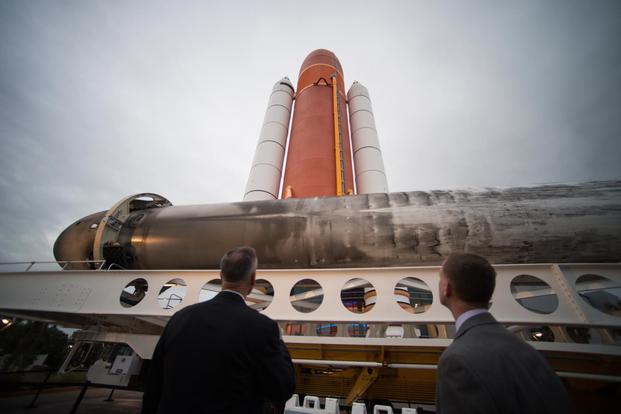The Pentagon submitted its Space Force legislative proposal to Congress this week, asking for $72 million in fiscal 2020 to stand up a headquarters and $2 billion over five years to fund the newest military branch, officials said Friday.
The initial plans call for 200 people to establish the headquarters, and 15,000 personnel overall, according to five senior Pentagon defense officials, who spoke Friday on the condition of anonymity. The budget has already been reported by various news outlets.
If Congress approves, the service will begin moving uniformed and civilian personnel to the new headquarters staff in fiscal 2020, with mission transfer and realignment of units occurring between fiscal 2021 and 2022, according to a strategic overview document the officials provided.
"This is an historic moment for our nation," Acting Defense Secretary Patrick Shanahan said Friday.
Related content:
- STRATCOM Will Get a Piece of Space Force Mission, General Says
- Trump Signs Directive That Would Place Space Force Within Air Force
- Skinny Space Force? Budget Analyst Says a $3 Billion Service Is Possible
"The Department of Defense's legislative proposal to establish the United States Space Force as the sixth branch of the armed forces is a strategic step toward securing America's vital national interests in space," he said in a provided statement. "Our approach follows President Trump's bold vision for space and commits resources to deliver more capability faster, ensuring the United States can compete, deter and, if needed, win in a complex domain."
The Space Force's new headquarters "space staff" at the Pentagon will be fully functional for it to "compete and operate alongside the other services," the official said.
The streamlined strategy rebuts the U.S. Air Force's original assertion that the Pentagon would need roughly $12.9 billion over five years to resource personnel and infrastructure for the branch.
The Defense Department is still working out the details for the proposed sixth military branch, which Trump recently announced will fall under the Department of the Air Force.
For example, the officials could not answer what mix of enlisted, officer and civilian personnel will make up the 15,000 eventual staff members, nor how many general officer positions there will be.
"This will take some time to get to; it's not going to be instantaneous," one official said.
The defense secretary will decide how existing space-focused units within the Army, Navy, Air Force and Marine Corps will be selected to transition into the Space Force. No units or bases have been identified yet, according to the officials.
There will not be a specific Space Force academy, as the Pentagon will leverage the existing academies for new talent, the officials said.
There may be Space Force uniforms, but that decision is part of "ongoing discussions" being worked through in the coming weeks and months, they added.
Other structural decisions are in flux.
For example, the proposal does not include incorporating intelligence agencies such as the National Reconnaissance Office into the Space Force, but it will take over some NRO functions currently executed by the Air Force, the documents state. There is potential for these agencies to be added later, according to the officials.
The officials on Friday stressed that the Pentagon wants the culture to be unique to the service, including its own rank structure and training.
"We want people to be recruited into the Space Force similar to the way the Marine Corps recruits Marines -- they don't recruit them into the Navy," an official said.
Like the Marine Corps, the Space Force will not create billets for jobs such as chaplains, doctors or Judge Advocate General officers in order to save costs, instead planning to borrow those personnel from the other services.
For the time being, one official said, any new recruit who would like to enlist in the military for a space job should first "go to the Air Force."
"The domain is pivotal to future conflicts. The Space Force by far will be the most technical, and there is no easy comparison" to other services, an official said.
"We think we have proposed something that addresses [space challenges]," another said.
-- Oriana Pawlyk can be reached at oriana.pawlyk@military.com. Follow her on Twitter at @Oriana0214.










